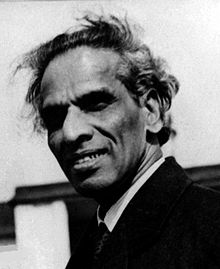VK Krishna Menon
| V. K. Krishna Menon | |
|---|---|

Krishna Menon (1950, age 54).
|
|
| Born |
Vengalil Krishnan Krishna Menon 3 May 1896 Calicut, Malabar district, Madras Presidency, British India |
| Died | 6 October 1974 (aged 78) Delhi, India |
| Nationality | Indian |
| Alma mater |
Presidency College, Chennai Madras Law College University College London London School of Economics |
| Predecessor | Kailash Nath Katju |
| Successor | Yashwantrao Chavan |
| Political party | Indian National Congress |
| Awards | Padma Vibhushan (1954) |
| Defence Minister of India | |
|
In office 17 April 1957 – 31 October 1962 |
|
| Member of the Lok Sabha from Trivandrum | |
|
In office 1971–1974 |
|
| Member of the Lok Sabha from Midnapore | |
|
In office 1969–1971 |
|
| Member of the Lok Sabha from North Mumbai | |
|
In office 1957–1967 |
|
| Indian Ambassador to the United Nations | |
|
In office 1952–1962 |
|
| Member of the Rajya Sabha from Kerala | |
|
In office 1956–1957 |
|
| Member of the Rajya Sabha from Madras State | |
|
In office 1953–1956 |
|
| Indian High Commissioner to the United Kingdom | |
|
In office 1947–1952 |
|
| Preceded by | Position established |
| Succeeded by | B. G. Kher |
| Personal details | |
| Source | Parliament of India |
Perhaps see Atmananda Krishna Menon
Vengalil Krishnan Krishna Menon (3 May 1896 – 6 October 1974) was an Indian nationalist, diplomat, and politician, described by some as the second most powerful man in India, after his ally, 1st Prime Minister of India Jawaharlal Nehru.
Noted for his eloquence, brilliance, and forceful, highly abrasive persona, Menon inspired widespread adulation and fervent detraction in both India and the West; to his supporters, he was an unapologetic champion of India in the face of Western imperialism, who famously "taught the white man his place"; to his Western detractors, "Nehru's evil genius". U.S. president Dwight D Eisenhower characterised him as a "menace ... governed by an ambition to prove himself the master international manipulator and politician of the age", while Indian president K.R. Narayanan eulogised him as a truly great man; decades after his death, Menon remains an enigmatic and controversial figure.
As a young man, Menon served as founding editor of the Pelican Imprint of Penguin Books, and led the overseas wing of the Indian independence movement, launching the India League in London, aggressively campaigning within the United Kingdom to win public support for Indian independence, and rallying the support of such superpowers as the Soviet Union. In the immediate wake of independence, Menon emerged as engineer of and spokesman for India's foreign policy, and, more generally, architect of the non-aligned movement; he headed India's diplomatic missions to the United Kingdom and the United Nations, and distinguished himself in diplomatic matters including the Suez crisis. In 1957, Menon set the record for the longest speech before the U.N. Security Council while defending India's rights to the disputed territory of Kashmir, in the process earning widespread popularity and the sobriquet "Hero of Kashmir" in India.
...
Wikipedia
